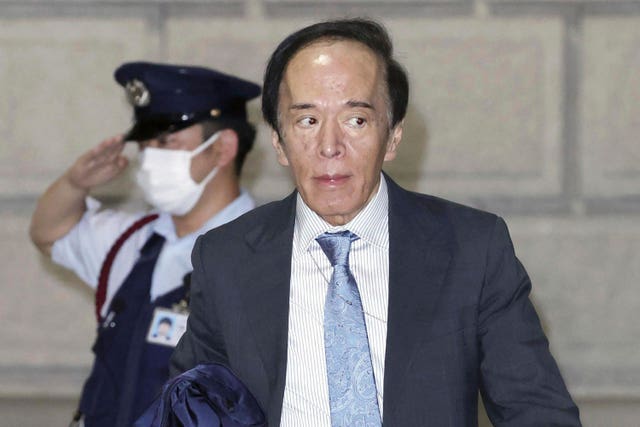
The Bank of Japan raised its key interest rate to about 0.25% from a range of zero to about 0.1%, in a bid to curb the yen’s slide against the US dollar.
The move was widely expected, and the yen gained sharply against the dollar ahead of and after Wednesday’s decision, trading below 152 yen (197.8 yen to the pound).
Concerns have been deepening about the yen’s recent drop to 160-yen levels to the dollar. That hurts an economy that imports almost all its oil, as well as other items like food.
The decision on the overnight call rate came just four months after the central bank raised its key rate above zero for the first time in 17 years.
Bank of Japan (BoJ) governor Kazuo Ueda told reporters the bank acted because the foundation of the Japanese economy was relatively solid, with gradual price rises accompanied by wage increases, despite worries about personal spending holding up as prices rose.
He acknowledged additional rate rises may be coming within this year, depending on how the economy holds up, including how the latest rate increases may affect economic activity and prices. He declined to give a specific date.
“In the long term, we think that adjusting longtime extremely low interest rates shouldn’t be rushed, and overall risks can be reduced,” he said.
Share prices in Tokyo rose after the decision, with Japan’s benchmark Nikkei 225 finishing 1.5% higher.
Japan’s central bank has kept interest rates near or below zero for nearly a decade, seeking to spur inflation in what has been a deflationary economy, and hopefully sustaining stronger growth for one of the world’s largest economies.

Mr Ueda said he did not want to come out and say that Japan had escaped deflation, but he stressed that prices seemed to be steadily increasing.
The zero-rate strategy was controversial. When wages failed to keep pace with price increases, consumers tended to spend less rather than more. A weak yen has pushed prices in Japan higher since it makes imported gas, oil and other necessities more expensive.
The main index of inflation has exceeded the BoJ’s target of about 2% for months.
“Inflation expectations of firms and households have risen moderately,” the BoJ said in its policy statement.
“The year-on-year rate of change in import prices has turned positive again, and upside risks to prices require attention.”
The ultra-lax monetary policy also involved massive central bank purchases of Japanese government bonds and other assets to inject cash into the economy. The BoJ has been moving toward unwinding that but was wary of stifling growth by raising the cost of borrowing.
On Wednesday, it said it would reduce the amount of its purchases, long at tens of trillions of yen a month, so that they will be about three trillion yen (around £14.7 billion) in the January-March quarter of 2026, or about half of the current six trillion yen (around £30 billion).
Ipek Ozkardeskaya, senior analyst at Swissquote Bank, noted the BoJ had used language that “was quite bullish on prices”, meaning more rises were likely.
Analysts say the central bank’s focus was on what many see as the overly weak yen, while taking care not to set off any negatively dramatic overreactions in the economy.
The central bank shifted away from a negative policy rate only in March, raising the overnight call rate for banks to 0.1% from minus 0.1%.
The dollar’s gains have reflected high interest rates in the United States, where the US Federal Reserve is forecast to cut its main rate in September and to hold steady at a policy meeting later Wednesday.
The Bank of England is due to issue a rate decision on Thursday.


Why are you making commenting on The Herald only available to subscribers?
It should have been a safe space for informed debate, somewhere for readers to discuss issues around the biggest stories of the day, but all too often the below the line comments on most websites have become bogged down by off-topic discussions and abuse.
heraldscotland.com is tackling this problem by allowing only subscribers to comment.
We are doing this to improve the experience for our loyal readers and we believe it will reduce the ability of trolls and troublemakers, who occasionally find their way onto our site, to abuse our journalists and readers. We also hope it will help the comments section fulfil its promise as a part of Scotland's conversation with itself.
We are lucky at The Herald. We are read by an informed, educated readership who can add their knowledge and insights to our stories.
That is invaluable.
We are making the subscriber-only change to support our valued readers, who tell us they don't want the site cluttered up with irrelevant comments, untruths and abuse.
In the past, the journalist’s job was to collect and distribute information to the audience. Technology means that readers can shape a discussion. We look forward to hearing from you on heraldscotland.com
Comments & Moderation
Readers’ comments: You are personally liable for the content of any comments you upload to this website, so please act responsibly. We do not pre-moderate or monitor readers’ comments appearing on our websites, but we do post-moderate in response to complaints we receive or otherwise when a potential problem comes to our attention. You can make a complaint by using the ‘report this post’ link . We may then apply our discretion under the user terms to amend or delete comments.
Post moderation is undertaken full-time 9am-6pm on weekdays, and on a part-time basis outwith those hours.
Read the rules here